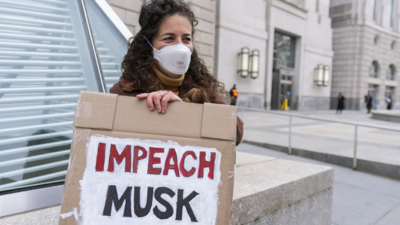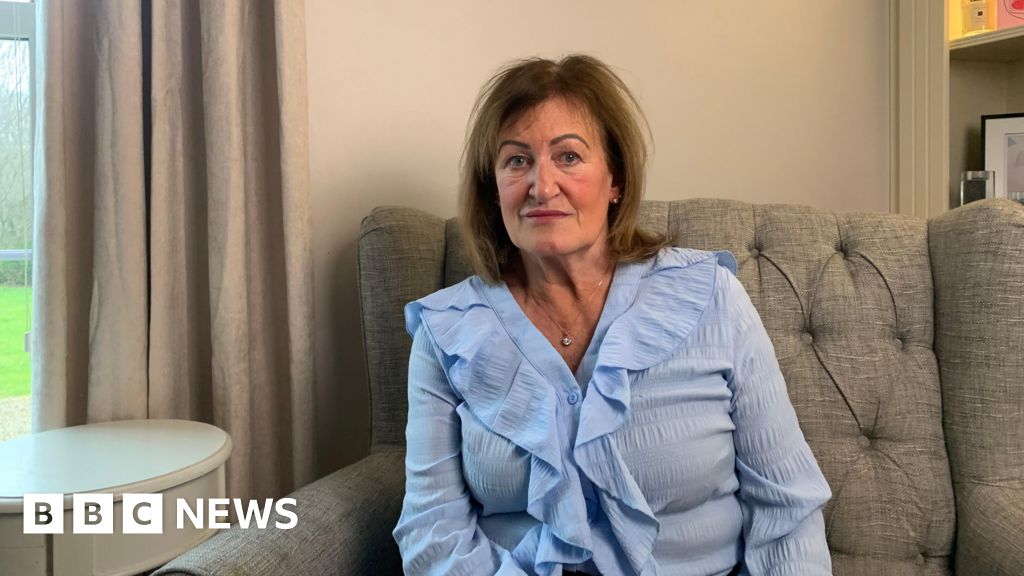
USAID contract worker carries a sign outside the agency's headquarters in Washington (Image credits: AP)
WASHINGTON: A pair of court orders have had only limited effect in slowing the
Trump
administration's dismantling of the US agency for international development and have left some
USAID
workers stationed worldwide in precarious situations, staffers assert.
The Trump administration has stalled medical evacuations for as many as 25 USAID staffers and spouses in the later stages of high-risk pregnancies overseas, according to testimony in lawsuits and a person familiar with the cases. The person was not authorized to speak publicly so spoke on condition of anonymity.
USAID "will undertake all measures as appropriate to ensure the safety and security of current employees," deputy administrator
Pete Marocco
said in a court filing Thursday asking a judge to let him move forward with a plan to pull all but a fraction of employees off the job worldwide.
The administration says it is taking all required care of staffers as it terminates USAID programs and aims to recall thousands of workers and their families abroad.
Multiple lawsuits from groups representing USAID workers and nonprofits and businesses are challenging President Donald Trump's freeze on foreign assistance, USAID job cuts and the sudden shutdown of the agency overall. Court orders have temporarily blocked the halt to funding and removal of thousands of workers from their posts, with a judge set to decide Friday whether to keep the staffing moves on hold. The administration has accused USAID's programs of being wasteful and promoting a liberal agenda.
Pregnant women fear over their care
Meanwhile, American women and their spouses say they have been left in substandard medical care in posts in unstable countries, fearing for their lives.
"Everyone says I need to wait and see what happens" with Trump administration decisions, a USAID staffer, whose pregnancy is complicated by high-blood pressure, said in a court filing from her posting in an undisclosed country in Africa.
The woman's affidavit and others from staffers were filed with courts anonymously because of repeated warnings from the Trump administration that USAID staffers risk dismissal if they speak publicly.
"I have a due date that does not allow me to just wait and see what happens," the USAID staffer wrote. "If I cannot medevac as planned, I will be in a life-threatening situation."
In another case, a pregnant spouse of a USAID worker was left hemorrhaging in a foreign hospital bed to await delivery, her husband said in another affidavit. The intervention of a US senator, who was not identified in the the affidavit, secured the government's agreement to pay for a medical evacuation. But doctors say the approval came too late in her pregnancy for her to safely take a long series of flights back to the US, even with medical escort.
The
state department
did not respond to requests for comment on workers' allegations that the government was stalling or refusing medical evacuations.
Workers facing other uncertainty abroad
US district judge
Carl Nichols
was due to decide whether to keep temporarily blocking a Trump administration order that would put thousands of USAID staffers on leave. Lifting that order also could allow the administration to start the clock on a 30-day deadline for USAID workers abroad to leave their posts.
"This is a mess," Nichols said in a hearing this week of the administration's handling of USAID staff cuts.
Lawyers for employee groups presented Nichols with accounts saying that the Trump administration had left workers without direction or funding when political violence in Congo forced their evacuation.
USAID officials paid for two meals and offered the evacuated Congo-based employees an opportunity to look at boxes of donated clothing once they arrived in Washington, said the staffers, who were not identified in court documents.
Administration officials otherwise have left the evacuated staffers to rack up tens of thousands of dollars in uncompensated hotel bills, with no guidance on whether they should stay in Washington, go elsewhere or whether they still will have a job, the lawsuit charges.
USAID workers still overseas describe their lives as in chaos and lacking guidance from the government, including USAID failing to pay electricity bills.
Staffers told the courts in written testimony that they fear being left without time or the means to sell their homes or pay off angry landlords owed money. But they say they fear being targeted if they try to stay beyond the current 30-day deadline, frozen by Nichols' earlier order, to return to the US at government expense.
Other staffers offered testimony about being cut off from US government communications. Multiple contract employees have told the AP that "panic button" apps and other alert systems on their phones meant to notify the US government in the event of a safety threat were cut off for at least some time.
Lifesaving programs still offline
Current and former USAID officials say the funding freeze and staff reductions have kept even lifesaving programs worldwide offline despite secretary of state Marco Rubio granting waivers.
That includes programs such as a two-decade-old AIDS and HIV program, called the President's Emergency Plan for AIDS Relief, or PEPFAR, credited with saving more than 20 million lives in Africa as well as a disease-outbreak response that normally would be trying to prevent further spread of recent Ebola cases in Uganda, according to two officials for those programs.
Staffing cuts also have reduced some of the U.S. disaster-response teams for earthquakes and other global crises, said a former senior USAID official with direct knowledge of the situation.
All the officials spoke on condition of anonymity for fear of retaliation.
While
Rubio
and others say waivers are allowing programs including PEPFAR to continue and warned USAID staffers in a recent memo against saying otherwise, agency staffers and federal judges have found that no funding is getting through to allow that to happen.
USAID's payment system was disabled earlier in the shutdown, and it remains nonfunctioning, according to USAID staffers and filings.

 15 hours ago
3
15 hours ago
3








